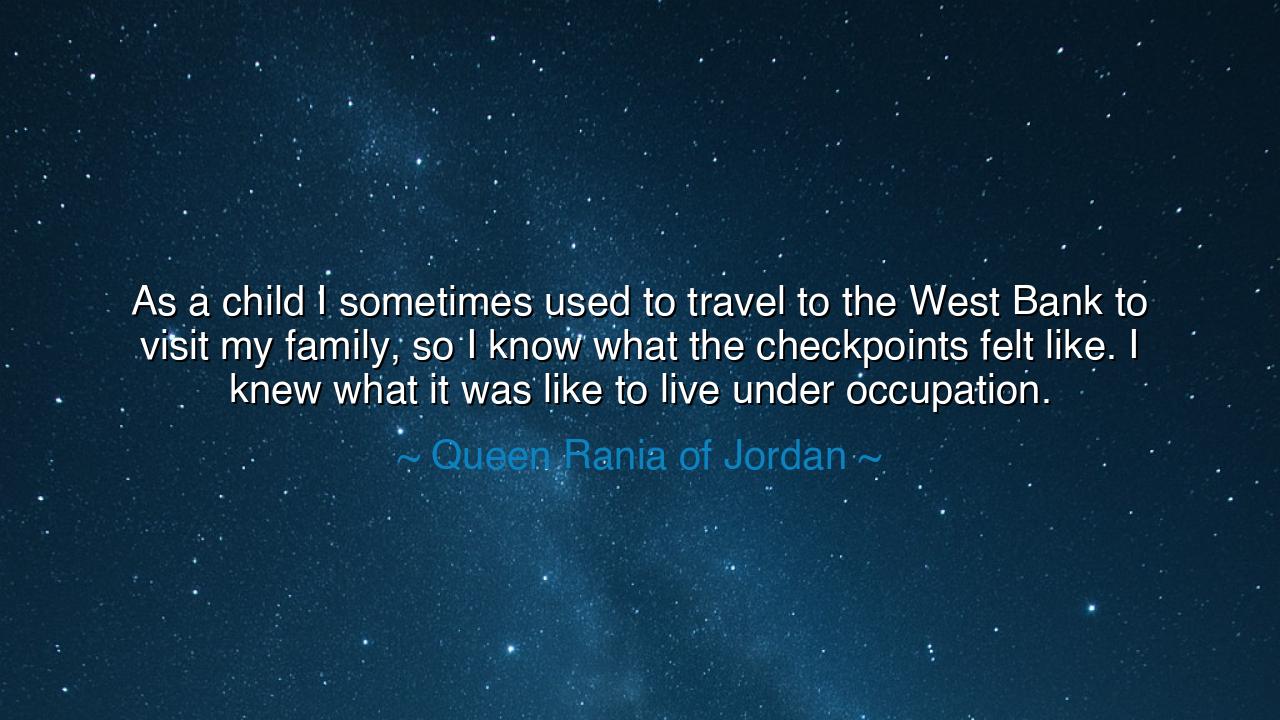
As a child I sometimes used to travel to the West Bank to visit
As a child I sometimes used to travel to the West Bank to visit my family, so I know what the checkpoints felt like. I knew what it was like to live under occupation.






The words of Queen Rania of Jordan — “As a child I sometimes used to travel to the West Bank to visit my family, so I know what the checkpoints felt like. I knew what it was like to live under occupation.” — resound not only as personal memory, but as testimony borne from generations who have walked the path of struggle and yearning. In them lies the voice of innocence scarred by constraint, of a child who tasted the bitterness of barriers, yet grew into a woman whose vision stretches beyond walls. These words, though tender in tone, carry the weight of nations and the sorrow of exiled hearts.
The child, in her purity, does not understand politics or power. She feels only the sharp sting of restriction, the silent wound of being told, “You may not pass freely.” Thus, the checkpoints become more than gates of stone and wire; they are the symbols of separation, a reminder that her people’s footsteps are measured, halted, and controlled. For the one who is young, such things leave an imprint deeper than words. They etch into the soul the knowledge of what it means to be occupied, not merely as a political condition, but as a daily reality of waiting, of uncertainty, of dignity restrained.
History is filled with echoes of this truth. Recall the Berlin Wall, a concrete scar that divided families and severed a city’s soul. Children grew beneath its shadow, learning early that freedom was not their birthright, but a privilege granted or denied. Yet when the wall fell, it was not just stone that crumbled, but the heavy yoke of despair. So too in Queen Rania’s memory do the checkpoints stand as walls within her childhood, and yet her voice now calls for bridges, for the lifting of burdens so that no child may inherit the chains of their parents.
There is a quiet heroism in this confession. For to speak of one’s own experience of occupation is not to dwell in bitterness, but to affirm truth, to resist the erasure of memory. Queen Rania’s words remind us that even those who ascend to palaces carry within them the soil of their youth, the taste of dust upon the road, the sting of waiting under watchful eyes. It is precisely because she remembers that she can stand as an advocate, her compassion rooted not in abstraction but in lived reality.
From this we learn a lesson of profound weight: never forget the trials of your early days, for they are the seeds of your wisdom. The hardships borne in youth, though painful, shape the voice you will one day raise for others. Just as the Queen carries within her the memory of checkpoints, so too do we all bear memories of smaller fences, smaller denials, which can teach us empathy for those whose chains are heavier.
The teaching for the generations is clear: strive to remove the barriers that divide, whether they be of stone, of prejudice, or of pride. If you hold power, use it to open gates rather than to close them. If you walk as a common soul, let your words and deeds dismantle walls of misunderstanding and hatred. Do not pass by the oppressed without recognition, for to ignore their struggle is to become the wall itself.
In practice, let each listener act. Build friendships across divisions. Stand beside those who suffer restriction. Speak truth to injustice, however small, so that you may train your spirit for greater struggles. And when you find yourself in freedom, do not forget the many who still wait at their checkpoints, yearning for dignity.
Thus the Queen’s words, born of a child’s memory in the West Bank, become a teaching for all mankind: that the pain of occupation must not be carried into the future as destiny, but transformed into resolve for peace, for freedom, and for the sacred right of every soul to walk unbound upon the earth.






AAdministratorAdministrator
Welcome, honored guests. Please leave a comment, we will respond soon